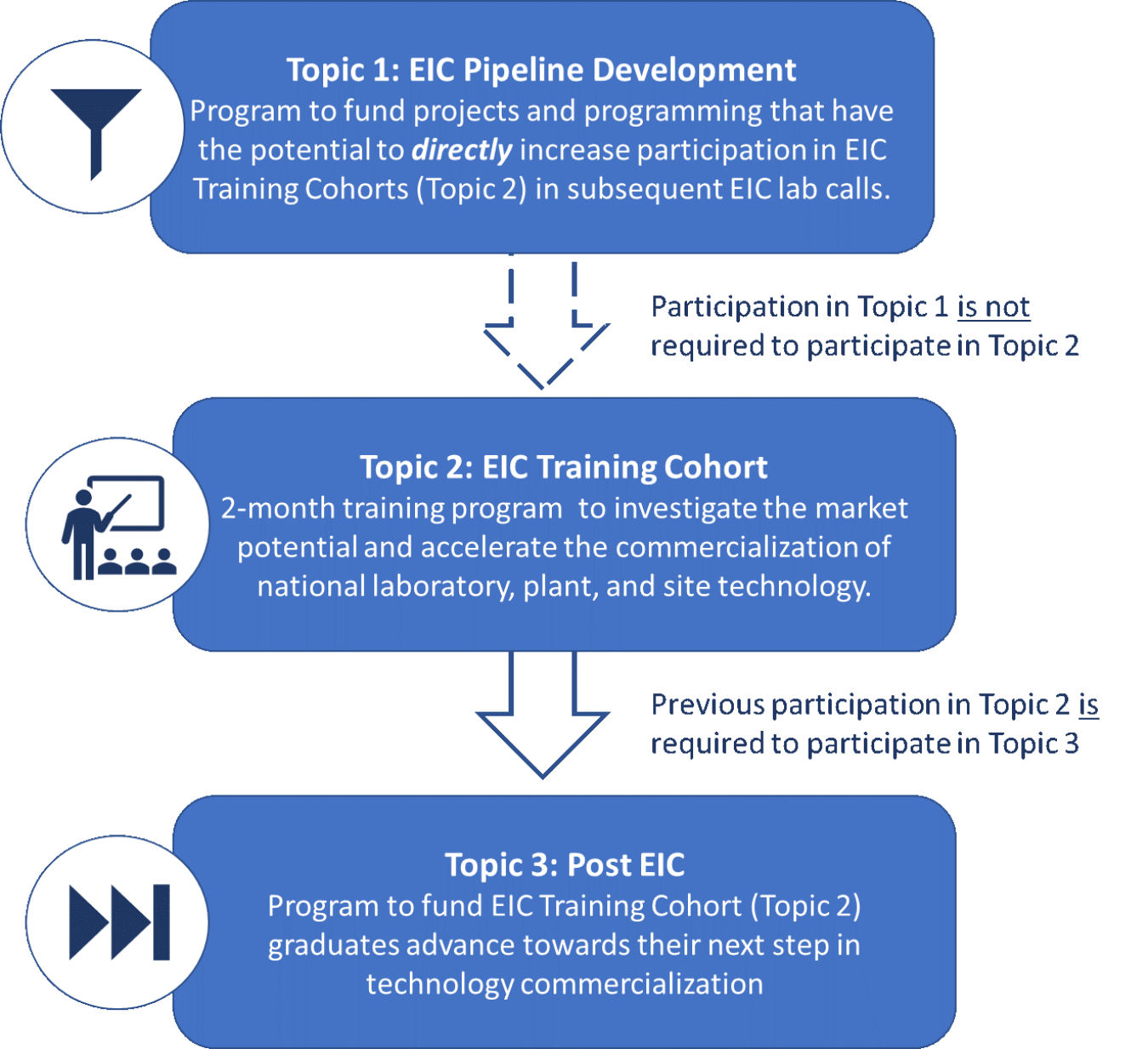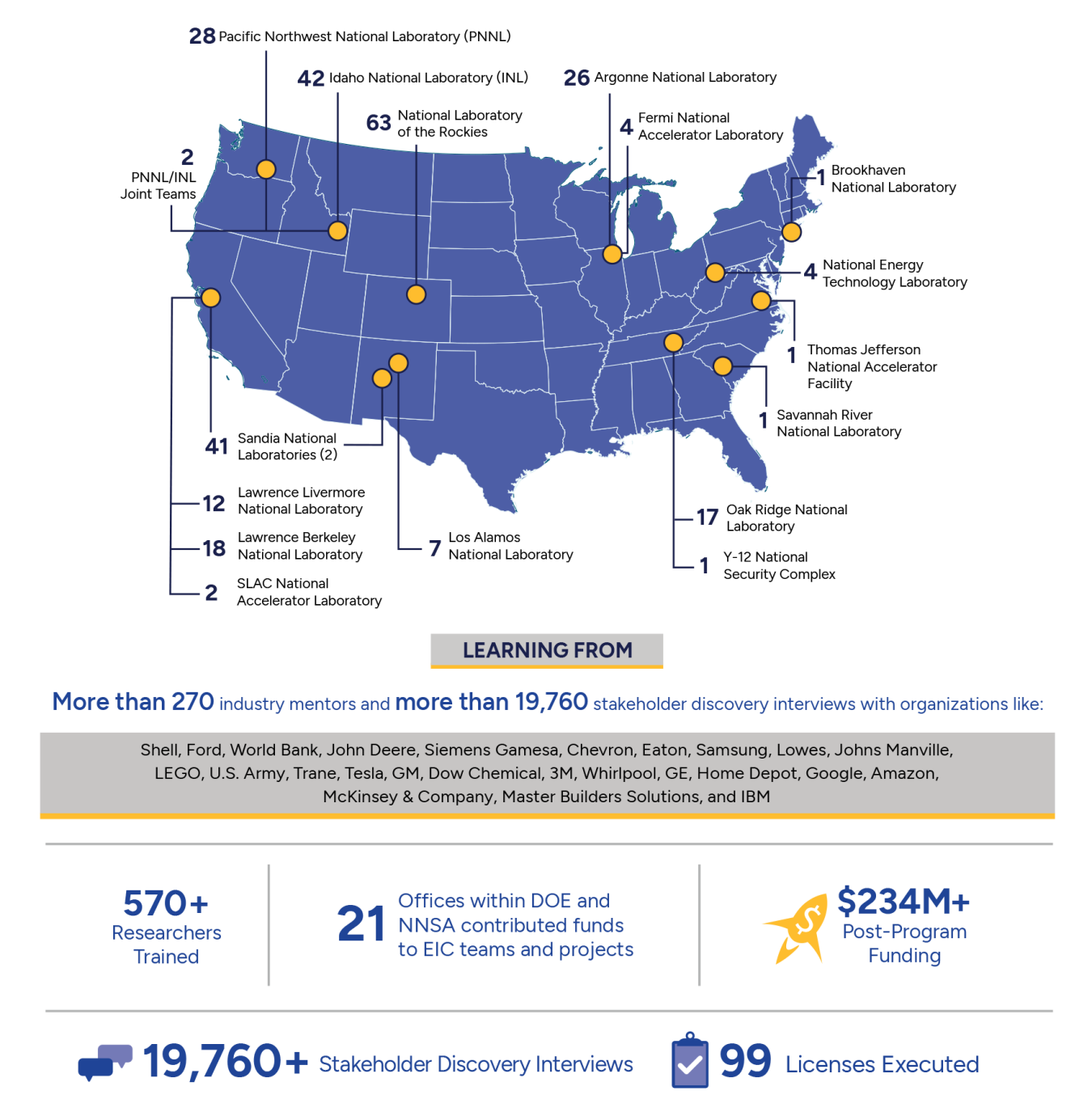Video describes the Energy I-Corps program and how it strengthens the clean energy economy. Text version
The U.S. Department of Energy (DOE) invests millions of dollars every year into the National Lab complex. This investment allows the National Laboratories to tackle the critical scientific challenges of our time—from renewable energy and quantum computing to creating a more resilient energy grid. The discoveries and innovations being developed by the labs have an even greater impact when we invest in bringing these ideas to the market where they can benefit the nation and world.
Energy I-Corps, a key initiative of DOE's Office of Technology Commercialization (OTC), invites teams of researchers to participate in an immersive two-month training during which the researchers define technology value propositions, conduct customer discovery interviews, and explore viable market pathways for their technologies.
Researchers return to the lab with a framework for industry engagement to guide future research and inform a culture of market awareness within the labs. In this way, Energy I-Corps is ensuring our investment in the national labs is maintaining and strengthening long-term U.S. competitiveness.
Program Impact
Established in 2015 and formerly known as DOE’s Lab-Corps, Energy I-Corps became part of the OTC portfolio in 2018. See the graphic below to learn about the program’s impact to date.
Want to learn about current and past participants?
Who Can Participate?
Applicants apply to OTC's Energy I-Corps as a team composed of:
- A principal investigator (PI) with a commercially relevant technology from one of the national laboratories
- An entrepreneurial lead (EL)
- An industry mentor.
Over the course of the training and by interviewing at least 75 industry stakeholders, teams identify potential market pathways for their selected technologies, as well as identify opportunities where further development could lead to commercial value.
The time commitment is significant for both the PI and the EL throughout the program.
Customized Curriculum
The Energy I-Corps curriculum was initially developed in 2015 in partnership with the National Science Foundation's (NSF) Innovation Corps (I-Corps). Adjustments made to the NSF I-Corps curriculum address the specific challenges scientists working within the national lab environment face getting their innovations ready for market, such as navigating the complexities of IP bundling. As more research teams complete the training, OTC continues improving and enhancing the Energy I-Corps curriculum to best meet participant and industry needs.
OTC's Energy I-Corps program is intended to:
- Increase the number of national laboratory-developed technologies that are transferred into commercial development or industry agreements
- Train national laboratory researchers to better understand the commercialization process and private sector needs
- Transform national laboratory culture to value commercialization and entrepreneurial activities.
Energy I-Corps has supported teams assembled from the following national labs:
- Argonne National Laboratory
- Brookhaven National Laboratory
- Fermi National Accelerator Laboratory
- Idaho National Laboratory
- Lawrence Berkeley National Laboratory
- Lawrence Livermore National Laboratory
- Los Alamos National Laboratory
- National Energy Technology Laboratory
- National Renewable Energy Laboratory
- Oak Ridge National Laboratory
- Pacific Northwest National Laboratory
- SLAC National Accelerator Laboratory
- Sandia National Laboratory
- Savannah River National Laboratory
- Thomas Jefferson National Accelerator Facility
For each class of Energy I-Corps teams, national labs recruit researchers working on energy technologies that have shown potential for commercial application.
Together, these researchers receive comprehensive training and each conduct at least 75 stakeholder discovery interviews with industry. Once they have completed the training, participants have secured the necessary industry connections and insights to ready their energy technologies for the market, and gained an industry engagement framework to apply to future research and share with fellow researchers.
Other Energy I-Corps Opportunities
In response to the evolution of the Energy I-Corps program within DOE and feedback from national lab partners and DOE program office supporters, OTC introduced additional funding tracks beyond the historically-offered immersive training cohort.

In response to the evolution of the Energy I-Corps program within DOE and feedback from national lab partners and DOE program office supporters, OTC developed the Energy I-Corps Pipeline Development (Topic 1) opportunity.
Within this program, national labs, plants and sites are provided up to $100,000 to implement projects and programming that have the potential to directly increase participation in subsequent Energy I-Corps training cohorts. OTC provides each lab the latitude to develop a program to best serve their unique research community while seeding the idea of participation in the traditional Energy I-Corps program.
Learn about selected projects from each lab call:
Teams that complete Energy I-Corps training cohorts are excited about their newfound skills and strategies to commercialize their technologies, but often lack actionable next steps. The Post Energy I-Corps (Topic 3) opportunity supports a small subset of the most promising training cohort graduates with a high likelihood of commercializing their technology.
Teams can receive up to $100,000 to cover costs of the next actionable step in technology commercialization and facilitate the teams in reaching their next source of more substantive support to continue their commercialization journey.
Learn about selected projects from each lab call:
The DOE Emerging Tech Studio is an effort for participants to learn how to launch a technology-focused venture by leveraging DOE’s extensive portfolio of intellectual property across the DOE national laboratory, plant, and site network. Throughout the program, teams of highly talented entrepreneurs are paired with technologies on the forefront of innovation with the objective of creating market-defining startups.
Program Leadership and Management
Energy I-Corp is administered by OTC. The program leadership team is composed of:
- Anthony Pugliese, Chief Commercialization Officer and Director of OTC
- Carolina Villacis, Lead Program Manager
- Matt O'Brien, Program Manager.
Energy I-Corps Topic 2 is managed by the National Renewable Energy Laboratory on behalf of OTC. The program management team is composed of:
- Katie Woslager, Program Manager.
In addition, the program management team is supported by technology deployment professionals at each of the 17 national labs who are responsible for recruiting and preparing teams.


